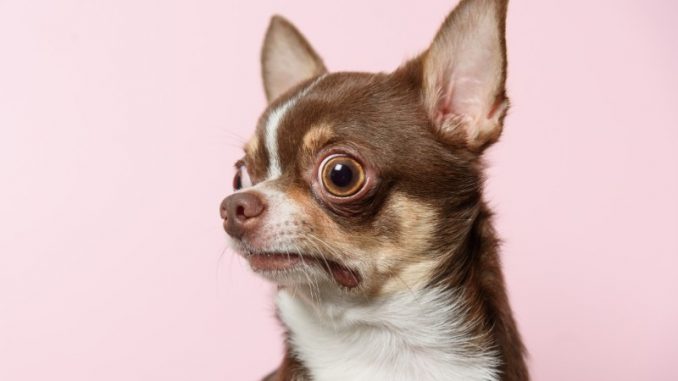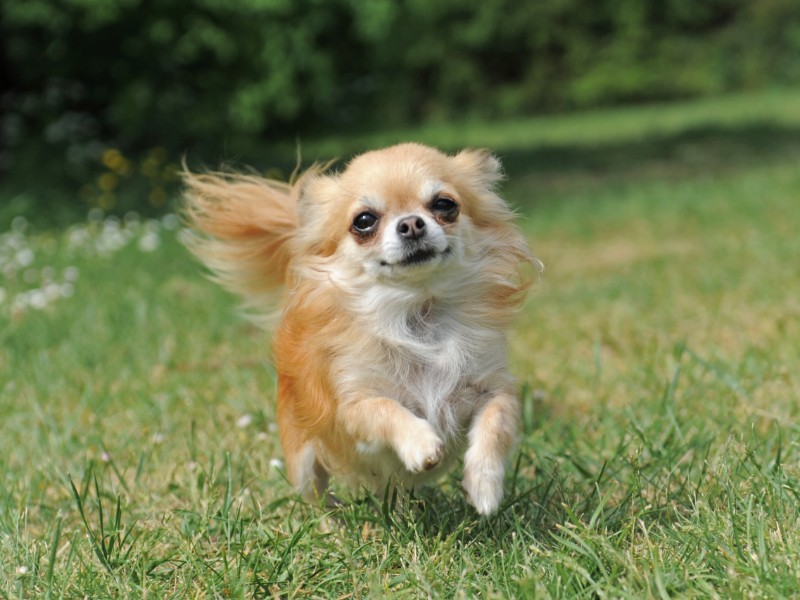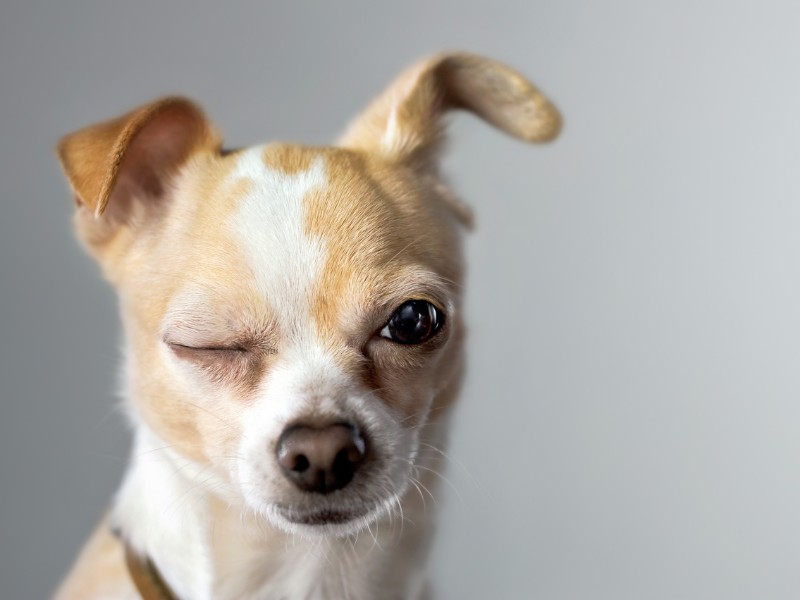The Chihuahua is a lively and alert dog breed. Bold, confident, and devoted to their owners, Chihuahuas are ideal pets for people who have the time to train and socialize their dogs.
Chihuahuas are tiny dogs with a naturally high energy level. These dogs reach up to 6–9 inches tall when fully grown and live for 12–20 years. A typical Chihuahua weighs from 3 to 6 pounds.
TABLE OF CONTENTS
Chihuahua Quick Summary
| Breed Type | Toy dog |
| Suitable For | Individuals, families with older children, people who spend most of their time at home and can devote enough time to their pet |
| Size | 6–9 inches |
| Weight | Up to 6 pounds |
| Grooming Needs | Moderate; grooming depends on the coat type, with long-fur coats requiring more attention |
| Lifespan | 12–20 years |
| Color Variations | Brown, black, fawn, red, and cream |
| Temperament | Alert and watchdog-like, lively and courageous, with an independent streak |
| Daily Exercise | Moderate, at least one 30-minute walk per day is required |
| Daily Food Consumption | 0.5–1 cups of dry kibble a day, divided into three meals |
| Known Health issues | Hip dysplasia, eye problems, luxating patellas (a kneecap issue), hydrocephalus (a buildup of fluid around the brain) |
Chihuahua Appearance
From Adobe Stock
Chihuahuas are small, skinny dogs with large, erect ears that are held upright when the dogs are alert. There are several types of Chihuahuas, each with their own unique appearance.
Different types of Chihuahuas include deer head Chihuahuas, apple head Chihuahuas, long haired Chihuahuas, short haired Chihuahuas, and teacup Chihuahuas.
Height and Weight
The average Chihuahua height is 6–9 inches. Chihuahuas are the smallest dog breed, but some Chihuahuas have been bred to be taller and can grow up to 15 inches.
Chihuahuas weigh between 6 and 9 pounds. Some Chihuahuas are bred to weigh less than this, but such light dogs aren’t healthy. Oversized Chihuahuas are also available and weigh 12 pounds or more. Large Chihuahuas are better suited to families with children because children are less likely to injure a bigger Chihuahua.
At 8 weeks old, a Chihuahua puppy weighs as little as 1.5 pounds. A Chihuahua that is smaller at puppy age is likely to be a smaller adult.
Coat
The color of a Chihuahua’s fur ranges from black to brown, fawn, red, and cream. Tricolor Chihuahuas are common, such as black or brown with white or tan markings.
There are two common Chihuahua coat types: long and smooth. Long-haired Chihuahuas have a flat or slightly curly coat, a fringe of hair on the ears, and a fan-like tail. These dogs have feathers on their feet, a ruff on their neck, and hair on their stomachs known as a frill.
Smooth-coated Chihuahuas have smooth, shiny coats with thinner hair on the ears compared to long-coated Chihuahuas. These dogs have fur that sits close to their bodies.
Head Shape
There are two types of Chihuahua head shapes: apple head and deer head.
Apple head Chihuahuas have rounded apple-shaped heads. The eyes of an apple head Chihuahua are large and protrude from the Chihuahua’s head. Apple head Chihuahuas have short, pointed snouts and shorter necks and are smaller than deer head Chihuahuas.
Deer head Chihuahuas have narrow heads and angled facial features, much like the features of a deer. The snout of a deer head Chihuahua is longer than the snout of an apple head Chihuahua, and the eyes are less pronounced.
Chihuahua Origins
Nobody knows for certain where the Chihuahua originates from, but many historians think that the Chihuahua’s homeland is Chihuahua, in Mexico. Specimens of Chihuahua are thought to have been first discovered in the mid-1800s.
In the 1880s, border tourists began buying Chihuahuas from Mexican merchants and bringing the dogs home as pets. Chihuahuas didn’t have an official name back then — the breed was named after the region in which it was found. As a result, Chihuahuas were named the Texas dog, the Mexican dog, the Arizona dog, and the Chihuahua. The name that stuck was the name that we all know today: Chihuahua.
Chihuahua Personality and Temperament
Chihuahuas are confident and alert and are often described as terrier-like. With larger-than-life personas, Chihuahuas are ideal for anyone looking for a quirky, entertaining pet.
Social interaction is important for Chihuahuas, and these dogs are best suited to people who spend a lot of time at home. Although Chihuahuas love being around people and form close bonds, these dogs can be snappy with children, so they’re better with adults and older children.
Other dogs can be housed with Chihuahuas, but big dogs might accidentally injure your tiny pet. Chihuahuas are bossy and often order around other pets, including bigger dogs. For this reason, having a Chihuahua as a single pet is most appropriate.
Taking Care of a Chihuahua Dog
From Adobe Stock
Taking care of a Chihuahua is moderately hard, and this breed needs owners who are engaged and willing to provide hours of daily attention.
Some people assume that Chihuahuas are easier to look after than big dogs because of their small size. However, this isn’t true — a Chihuahua requires just as much care as larger breeds.
Food Needs
A standard Chihuahua needs 0.5 to 1 cup of food per day. Larger Chihuahuas or dogs that exercise for more than half an hour per day require up to 1.5 cups of food per day.
Split your Chihuahua’s food portions into two or three, with separate meals throughout the day. The exact amount of food you should feed a Chihuahua depends on the dog’s size and metabolism and how much daily exercise the dog gets.
High-quality dried kibble is best for a Chihuahua. For a Chihuahua puppy, buy specialized puppy food with a high protein content.
Grooming Needs
Chihuahuas require a few minutes of grooming per week. Short-haired Chihuahuas should be brushed once a week with a brush with short bristles or a rubber grooming mitt. Brush long-haired Chihuahuas with a pin brush on a once-weekly basis. To remove loose hair, use a fine-toothed flea comb.
Although Chihuahuas don’t have heavy shedding periods, these dogs will shed the most in the spring and fall. During these months, frequent brushing will control shedding, especially for long-haired dogs.
Chihuahuas don’t need more than one bath per month. To prevent the dog’s coat from drying out, use specially formulated dog shampoo.
When grooming your Chihuahua, check the dog’s ears for odor and wax, and clean the ears with a cotton ball and a dog ear cleansing product if needed. Trim your Chihuahua’s nails if you hear the nails clicking on the floor. You should also brush the dog’s teeth at least three times a week to prevent dental health issues.
Exercise Needs
Chihuahuas are energetic dogs that love to play and run. They make great apartment dogs because even following their owners around their home keeps the dogs fit.
Take an adult Chihuahua on a half-hour walk every day. Chihuahuas have tiny legs, and these dogs tire easily because the dogs need to run to keep up with their owners.
Don’t speed-walk or jog with your Chihuahua — slow walking is best. Carry your dog home if your dog is panting and struggling to keep up.
Mental Needs
Chihuahuas crave attention, and too much alone time commonly leads to whining, barking, chewing, and scratching.
Chihuahua owners should make plenty of time to play with their dogs. Up to 10 minutes of playtime per day is fine for a Chihuahua puppy. Adult Chihuahuas benefit from 30 minutes of play. Playtime helps Chihuahuas to release energy and bond with their owners.
Although Chihuahuas love dog toys, not all toys will fit in the dogs’ mouths. Look for toys that are designed for small dogs. Puppy toys are an option, but these toys aren’t always durable enough for a Chihuahua. Chew toys made from strong rubber are good toys for Chihuahuas.
Common Health Concerns
There are a number of diseases and conditions that Chihuahuas are prone to. It isn’t guaranteed that your Chihuahua will get any of these diseases, but knowing what to look out for will help you to take fast action if necessary.
Patellar luxation, or slipped stifles, is common in Chihuahuas and other small dogs. This condition causes lameness in the legs due to a misalignment of the calf, thigh bone, and knee cap. Surgery is needed for severe cases of patellar luxation.
Hypoglycemia, or low blood sugar, is another health problem that toy breeds, including Chihuahuas, are prone to. In the early stages, hypoglycemia is easy to treat, but a dog could become seriously ill if the condition isn’t treated. Seek help if your dog is trembling and listless and has bluish-grey gums.
To reduce the potential for illness, buy a Chihuahua from a responsible breeder who can provide proof that both the dogs’ parents have health clearances.
How to Train a Chihuahua
Chihuahuas are smart dogs, but this breed can be stubborn and willful. A Chihuahua is fiercely protective of its owner, and without early socialization, this behavior can come across as unfriendly and aggressive. However, there are a lot of puppy training tips that will help your Chihuahua in its formative years.
Socialize your Chihuahua as early as possible to prevent hostility towards other dogs and people. Chihuahuas become demanding if you don’t lay down the rules, so you should teach your dog from puppy age that you’re the boss of the household.
Begin training when your Chihuahua is 8 weeks old. Start by teaching your Chihuahua the basic commands, getting the dog to sit and lie down on your word. You can then teach your dog how to roll over, beg, and more.
Chihuahuas are easy to train because they love to receive positive attention and crave mental stimulation. Reward your Chihuahua with a couple of treats at the end of the training session.
When house training a Chihuahua puppy, choose a spot in your yard to take your puppy to every time. Keep your Chihuahua on the leash while the puppy does its business to show your pet that you’re the pack leader and rule-maker in the house.
Chihuahua Price
From Adobe Stock
Chihuahuas are expensive dogs. Because Chihuahuas are tiny and have the cute factor, breeders can price these dogs highly because they know there are people willing to pay a lot of money for them.
How Much is a Chihuahua?
A Chihuahua costs $500 to $2,000. Price varies depending on location, the age of the dog, and the dog’s health status. As with all dog breeds, Chihuahua puppies cost more money than adults.
A Chihuahua from a championship bloodline costs thousands of dollars more than a non-championship Chihuahua. Championship breeds tend to have milder temperaments, making them ideal family pets.
A good breeder will include the price of vaccinations and early medical examinations in the dog’s purchase price. You should expect to pay more upfront for a dog that has been vaccinated.
Adopting a Chihuahua costs around $150, depending on the adoption fee asked for by the shelter. However, healthy, well-behaved young Chihuahuas are rarely put up for adoption.
How Much Does it Cost to Raise a Chihuahua?
The total cost of raising a Chihuahua is $500–$2,000 per year. Pet insurance and registration, grooming fees, pet licenses, first vaccinations, toys, bowls, treats, and beds are the costs most commonly associated with Chihuahua ownership.
Most people will spend upwards of $500 on toys, beds, leashes, food, and grooming in the first year of owning a Chihuahua, not including vets fees or treats.
Should You Get a Chihuahua?
Chihuahuas are intelligent, expressive, lively dogs that are devoted to their owners. However, not every lifestyle or family is right for a Chihuahua.
FAQs
- How Much Should a Chihuahua Eat?
- What Does Chihuahua Mean?
- How Much Should a Chihuahua Weigh?
- How Many Puppies Can a Chihuahua Have?
- Why Does my Chihuahua Shake?
- How Much Does a Chihuahua Cost?
- How Long Does a Chihuahua Live?
- Are Chihuahuas Good for First-time Owners?
- Are Chihuahuas Stubborn?
- How Smart is a Chihuahua Dog?
- Are Chihuahuas Hard to Train?
- Do Chihuahuas Bark a lot?
Chihuahuas are Suitable for:
Couples, single people, and families with older children are good owners for Chihuahuas. Homes of any size, including apartments, are suitable for Chihuahuas, although a home with a backyard is preferable.
Chihuahuas require a lot of mental stimulation, so these dogs are better suited to people who can spend at least one hour per day walking and playing with their dogs.
Chihuahuas are NOT Suitable for:
Families with children under 8 years old shouldn’t get a Chihuahua because Chihuahuas are a delicate breed, and young children are more likely to accidentally injure these dogs.
People who don’t have the time to train, socialize and play with their pets aren’t a good match for Chihuahuas. These dogs need early training to develop into friendly, sociable dogs. Chihuahuas often become destructive when left alone for long periods, so people who work long hours away from home shouldn’t buy a Chihuahua.





Be the first to comment